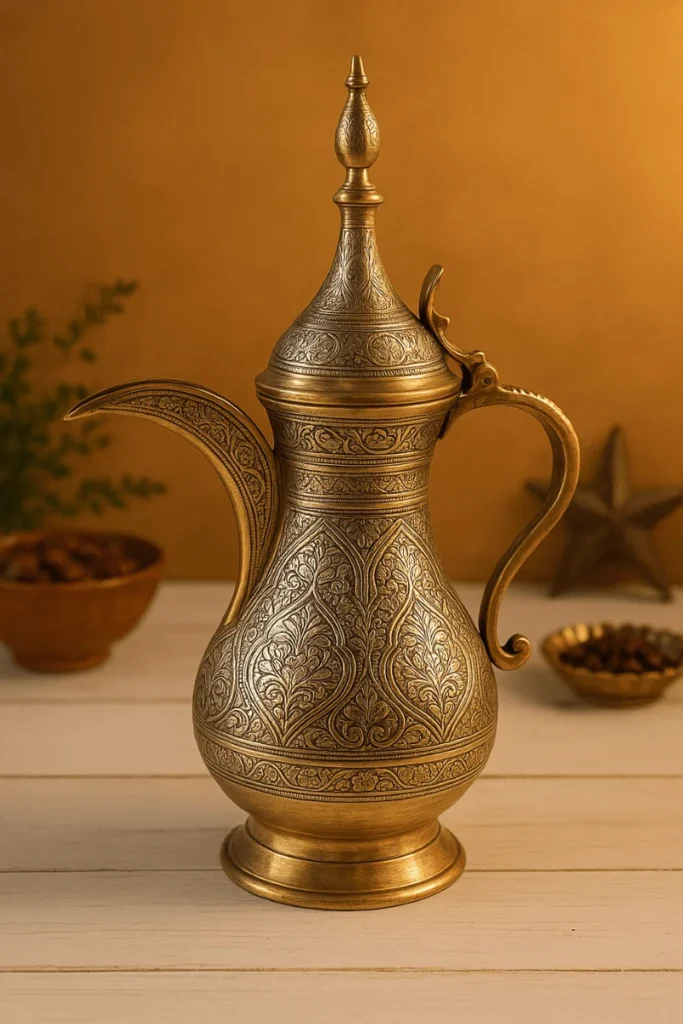Coffee has a million faces—instant, lattes, cold brews—but if you want to taste coffee the way it was meant to be, you’ve gotta try Yemeni coffee. This stuff is legendary. Imagine chocolate, dried fruit, wine-like zing, and spices all hanging out in one cup. Yep, that’s Yemeni coffee.
In this post, I’ll walk you through where it comes from, why it tastes so unique, and most importantly, how you can whip up an authentic Yemeni brew (including the famous Qishr) without booking a flight to Sana’a.
Table of Contents
The Enduring Legacy of Yemeni Coffee
Yemen: Coffee’s First Home Café
Fun fact: while coffee plants originally came from Ethiopia, Yemen is where people first figured out, “Hey, let’s drink this!” Back in the 1400s, Sufi monks were sipping coffee to keep themselves awake during late-night prayers. (Kinda like us during Netflix binges.)
The port city of Mocha, which gave your mocha latte its name, served as the Starbucks equivalent during the Middle Ages. From here, Yemeni beans sailed to the Ottoman Empire and Europe, fueling the first coffeehouses—aka the original social media platforms, but with fewer trolls.
Why Does It Taste Different
So what makes Yemeni coffee taste like nothing else?
Sky-high farms – Beans grow on tiny terraces carved into steep mountainsides, thousands of feet above sea level. Slow growth = more flavor.
Rain only – Farmers don’t use irrigation. Plants survive on natural rainfall, which stresses them (in a good way) and packs the beans with character.
Old-school drying – Instead of fancy machines, they just lay coffee cherries in the sun until they’re ready. It’s like nature’s slow cooker for flavor.
The result? Beans that hit your taste buds with layers of fruit, spice, and richness you won’t find in your average supermarket coffee.

What Yemeni Coffee Tastes Like
Think of it as coffee’s “greatest hits” album:
- Raisins, apricots, or figs for that dried fruit vibe.
- Smooth chocolate notes hold everything together.
- A little wine-like acidity for some zing.
- Cinnamon or cardamom whispers in the background.
- And a deep, earthy base that makes it feel serious and grounding.
Pro tip: go for a medium roast—too dark and you’ll lose all those fun flavors.
Meet Qishr: Yemen’s Spiced Ginger Coffee
So… What’s Qishr?
Forget fancy lattes. Yemenis savor Qishr, a customary spiced coffee crafted from the outer shells of coffee beans instead of the actual beans. Add ginger and sugar, and you’ve got a warm, sweet, slightly spicy cup that’s perfect for sharing. Think of it as Yemen’s answer to hot chocolate—only way cooler.
What You’ll Need
Here’s the simple shopping list for one cup:
| Ingredient | Quantity | Why it’s awesome |
|---|---|---|
| Coffee husks (from Yemeni beans) | 6 teaspoons | The highlight of the performance |
| Sugar | 4–6 teaspoons | Sweetness = comfort |
| Fresh ginger | 2 teaspoons | Kick of spice |
| Water | 1 cup (250 ml) | You know why |
| Optional spices | Pinch | Cinnamon/cardamom for flair |
How to Make It (No Barista Degree Needed)
- Grind it – Prepare the husks or buy them ready-made.
- Mix it – Throw husks, sugar, ginger, and water into a pot. Add cinnamon/cardamom if you’re feeling fancy.
- Boil & chill (not literally) – Bring it to a boil, then take it off the heat and let it rest.
- Repeat twice – Do that boil-and-rest thing two more times to lock in flavor.
- Sip & smile – Pour into small cups, gather your friends, and pretend you’re in a Yemeni mountain village.
Coffee in Yemeni Culture
In Yemen, coffee represents more than a drink—it’s an entire atmosphere. Guests are welcomed with coffee served from a traditional pot called a dallah, and families pass cups around like it’s a bonding ritual.
Historically, it even spread through the Ottoman Empire before conquering the world. In short: when you drink Yemeni coffee, you’re joining a centuries-old tradition of hospitality, generosity, and long conversations.

The World is Catching On (Slowly but Surely)
Rising Fame
Coffee nerds (myself included) are obsessed with Yemeni beans right now. Specialty shops and brands like Qamaria Coffee are showcasing the flavors, while people like Mokhtar Alkhanshali (Port of Mokha) are making Yemeni coffee cool again.
The Challenges Behind the Beans
But here’s the tough part: Yemen’s coffee industry faces some big hurdles.
- Conflict has damaged farms and roads.
- Water shortages are real, partly because so much goes to growing qat (a local cash crop).
- High costs & tricky shipping make exports tough.
- Without a doubt, the issues with shipping in the Red Sea have heightened the difficulties.
Despite all this, Yemeni farmers keep going. Why? Because coffee isn’t just money—it’s identity.
Looking Ahead: A Hopeful Future
Here’s the good news: lots of people and organizations are helping keep Yemeni coffee alive.
- Farmers are getting fairer prices for their beans.
- Women, who make up most of the workforce, are being empowered with training and independence.
- Sustainable farming practices are being promoted to save water and keep traditions intact.
So when you buy Yemeni coffee, you’re not just getting an amazing cup—you’re literally supporting families and preserving culture.

Conclusion
In the end, Yemeni coffee offers more than just a morning boost.. It’s history, tradition, resilience, an,d honestly, one of the most flavorful cups you’ll ever taste.
Whether you’re brewing dallah coffee, sipping a spiced Qishr, or tracing the story back to Al Mokha, you’re connecting with something way bigger than caffeine.
So next time you’re craving a coffee adventure, skip the usual latte and brew a little Yemen at home. Trust me—you’ll taste the difference, and maybe even feel a bit like a global coffee explorer.
FAQ
Where does Yemeni coffee grow?
Mostly on mountain terraces in places like Haraz and Bani Mater. Historically, the beans were shipped out of the port of Mocha.
Why does it taste so unique?
Altitude, natural rainfall, and old-school sun-drying = flavor explosion.
What’s Qishr again?
A spiced, ginger-sweet Yemeni drink made from coffee husks. Super cozy
Is it strong?
Flavor-wise, yes—it’s bold and complex. Caffeine-wise, about the same as other Arabica beans.
How can I support Yemeni farmers?
Buy from specialty roasters who source directly and pay fair prices. Your cup really does make a difference.

